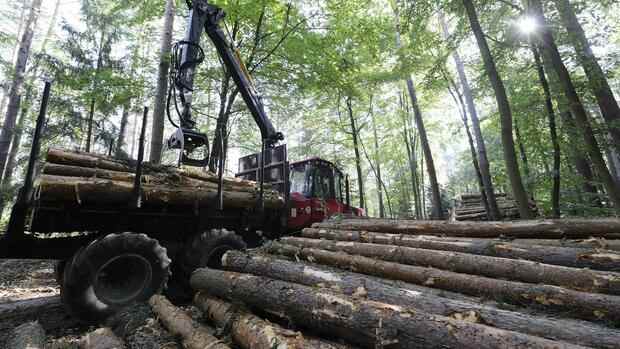Europeans are responsible for 10 percent of the consumption of forest resources.
(Photo: imago stock & people)
Brussels The clear cutting of the forests should come to an end by 2030, as the global community just decided at the climate conference in Glasgow. But the EU is not satisfied with this declaration of intent. This Wednesday, the Commission wants to present a law to ban products from deforestation areas from the European internal market. The Handelsblatt has received a draft.
Importers of beef, coffee, cocoa, palm oil, soy and wood must therefore be able to document in future that their products do not come from deforested areas.
The move is far-reaching, but urgently needed from the point of view of environmentalists. Because deforestation has assumed dramatic proportions globally: 1.3 million square kilometers of forest have been lost since 1990 – an area larger than South Africa. In Brazil, the Congo, Indonesia and Peru in particular, forests are dwindling. This also has consequences for the climate: Due to slash and burn, the Brazilian rainforest now emits more CO2 than it binds.
Analogy to the supply chain law should help
The EU now wants to use its market power. Your bill follows a similar logic as the Supply Chain Act to protect human rights.
Top jobs of the day
Find the best jobs now and
be notified by email.
Products that are traded on the European internal market should neither contribute to the modern exploitation of workers nor to deforestation. “With its approach based on deforestation due diligence, the Commission proposal offers a very good basis for negotiations,” says SPD MEP Delara Burkhardt. However, she is not yet completely satisfied.
Further products would have to be included in the scope of application, and the focus on forest protection “disregards other ecosystems that are important for the climate and species protection,” criticizes Burkhardt, who is in charge of the legislative proposal on the parliamentary side.
The Greens politician Anna Cavazzini, Chair of the Internal Market Committee, is basically satisfied with the proposal: “We have been contributing to deforestation, the destruction of biological diversity and land grabbing with our trade policy, our imports and our consumption for far too long”, admonishes them. “We need to make sure that this new law covers as many goods, businesses and ecosystems as possible.”
Europeans are one of the big polluters
According to calculations by the EU Parliament, around ten percent of global deforestation can be attributed to consumption by Europeans. Above all, palm oil, meat, soy, cocoa, eucalyptus, corn, wood, leather and rubber are responsible for this. According to the environmental organization WWF, the EU is the second largest importer of products after China, which are falling victim to forest areas.
In the European economy, however, the EU’s plans are being followed with concern: If the regulation turns out to be too restrictive, it could exacerbate the material deficiencies that companies are currently suffering from. The Commission does not brush this argument aside. According to their plans, the import of rubber and maize should be excluded from the regulation. In its impact assessment, the authority came to the conclusion that rubber and maize only contribute so little to deforestation that far-reaching due diligence obligations for importers would be disproportionate.
The fact that the Commission is pushing ahead with the anti-deforestation regulation also stems from a political calculation: It wants to save the trade agreement with the South American Mercosur states, the ratification of which has so far not progressed due to ecological concerns. Before the regulation can enter into force, it still has to be brought into line with the ideas of Parliament and the Member States.
More: “Don’t want to get under the wheels” – How the industry reacts to the results of the climate conference.
